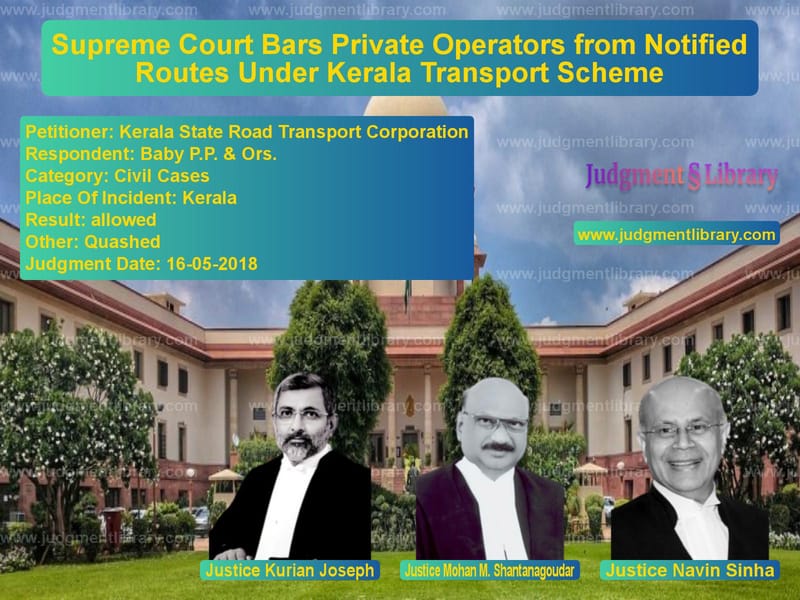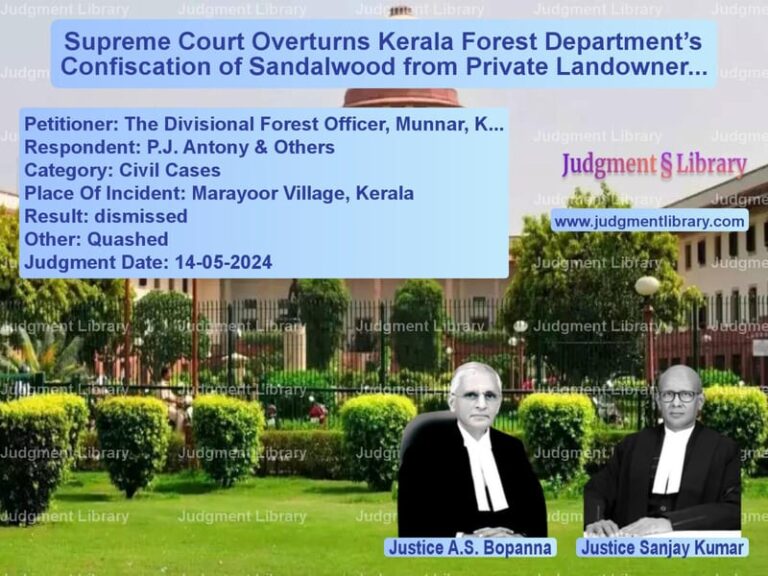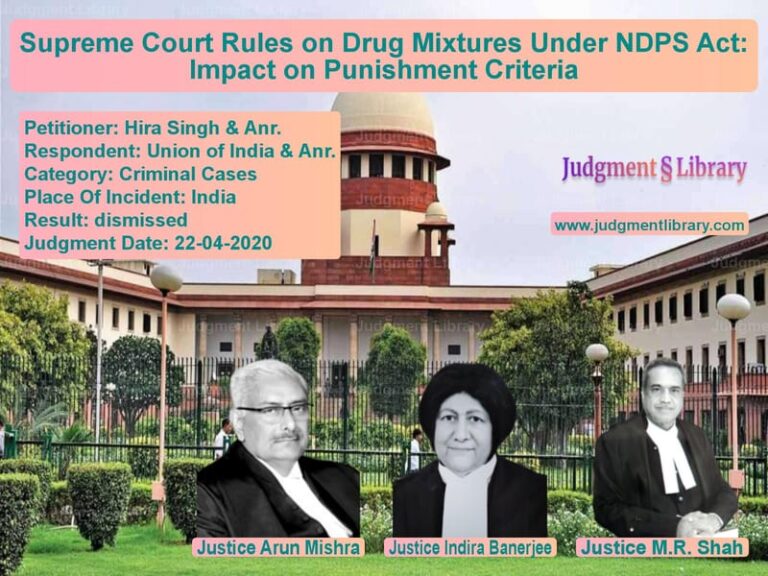Supreme Court Bars Private Operators from Notified Routes Under Kerala Transport Scheme
The case of Kerala State Road Transport Corporation v. Baby P.P. & Ors. revolved around whether private stage carriage operators could be granted temporary permits to operate on notified routes already served by the Kerala State Road Transport Corporation (KSRTC). The Supreme Court ruled in favor of the KSRTC, emphasizing that private operators cannot be allowed to overlap on notified routes beyond the permissible limits set by the transport scheme.
Background of the Case
The Kerala government, through a notification dated July 14, 2009, introduced a transport scheme under Section 100 of the Motor Vehicles Act, 1988. This scheme aimed at providing exclusive rights to the KSRTC to operate on certain notified routes to ensure better public transportation services.
The scheme specifically provided that:
- Permits issued to private operators before May 9, 2006 could continue until their expiry, after which regular permits would be granted.
- When KSRTC applied for a new service on a notified route, corresponding private permits expiring first would not be renewed.
- Private operators could be granted temporary permits only until KSRTC introduced its services.
- Private operators could only intersect a notified route up to a maximum of 5 kilometers or 5% of their route, whichever was less.
However, some private operators, including Baby P.P., challenged the KSRTC’s monopoly by seeking temporary permits on a notified route (Kottayam-Kozhikode) in excess of the permissible limits.
Arguments by the KSRTC
The KSRTC contended that:
- Private operators had no right to traverse notified routes beyond the limits provided in the scheme.
- The proviso to Section 104 of the Motor Vehicles Act only allowed temporary permits if KSRTC had not applied for a permit, which was not the case here.
- More than 450 KSRTC buses were already operating on the disputed route, making additional private permits unnecessary.
- Allowing private operators to overlap on notified routes beyond the scheme’s limits would defeat the very purpose of nationalizing the route.
Arguments by the Private Operators
The private stage carriage operators argued that:
- Section 104’s proviso allowed temporary permits when KSRTC failed to meet public demand.
- KSRTC was not running a sufficient number of buses, leaving a gap in transportation.
- The transport scheme should not override the statutory provisions under the Motor Vehicles Act.
- Since some private operators had already been granted temporary permits, they too should be allowed similar rights.
Supreme Court’s Observations
The Supreme Court rejected the arguments of private operators, stating:
“A temporary permit cannot be issued to a private stage carriage operator to traverse on the notified route which is being served by the STU in excess of the permissible distance provided under the scheme.”
The Court further clarified:
- The proviso to Section 104 does not override the scheme.
- If a transport scheme specifically excludes private operators, they cannot bypass this restriction by seeking temporary permits.
- The KSRTC was already running adequate services, making further private permits unnecessary.
- Temporary permits cannot be used as a backdoor entry to circumvent nationalization of transport routes.
Final Judgment
The Supreme Court set aside the Kerala High Court’s ruling and upheld the KSRTC’s right to operate exclusively on the notified route. The key takeaways from the ruling are:
- Private operators cannot traverse on a notified route beyond 5 km or 5% of their route.
- Temporary permits are only allowed if KSRTC has not applied for a permit.
- Notified transport schemes hold statutory authority over private permit applications.
- Private stage carriage operators cannot use intersection rules to overlap on notified routes.
Conclusion
This landmark judgment reinforces the authority of state transport undertakings over notified routes and prevents private operators from exploiting legal loopholes. By restricting unauthorized overlaps, the Supreme Court has upheld the integrity of public transportation policies aimed at ensuring a well-coordinated and efficient transport system.
Petitioner Name: Kerala State Road Transport Corporation.Respondent Name: Baby P.P. & Ors..Judgment By: Justice Kurian Joseph, Justice Mohan M. Shantanagoudar, Justice Navin Sinha.Place Of Incident: Kerala.Judgment Date: 16-05-2018.
Don’t miss out on the full details! Download the complete judgment in PDF format below and gain valuable insights instantly!
Download Judgment: Kerala State Road Tr vs Baby P.P. & Ors. Supreme Court of India Judgment Dated 16-05-2018.pdf
Direct Downlaod Judgment: Direct downlaod this Judgment
See all petitions in Contract Disputes
See all petitions in Judgment by Kurian Joseph
See all petitions in Judgment by Mohan M. Shantanagoudar
See all petitions in Judgment by Navin Sinha
See all petitions in allowed
See all petitions in Quashed
See all petitions in supreme court of India judgments May 2018
See all petitions in 2018 judgments
See all posts in Civil Cases Category
See all allowed petitions in Civil Cases Category
See all Dismissed petitions in Civil Cases Category
See all partially allowed petitions in Civil Cases Category







